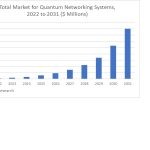AWS announces Center for Quantum Networking

Amazon Web Services is taking the next step on its quantum technology journey, today announcing the AWS Center for Quantum Networking (CQN), focused on the long-term work of helping the industry solve the challenges associated with building out quantum networks and a quantum internet.
The CQN follows the company’s other quantum ventures–the Amazon Braket cloud quantum computing service, AWS Quantum Solutions Lab, and the AWS Center for Quantum Computing. An AWS spokesman described the first two of those as being focused on the “near term,” while the Center for Quantum Computing and the new CQN are more focused on addressing the “long term” challenges of the quantum evolution.
For that reason, Antia Lamas-Linares, Principal Research Scientist, Quantum Computing at AWS, did not have much more specific to say about the CQN efforts, and potential products or services that could result. Asked if Amazon ultimately could produce repeaters that are so essential for long-range quantum networks, or end up building out a quantum key distribution (QKD) network of its own, a process already begun by a handful of telecom and tech giants, Lamas-Linares told IQT News via email, “We don’t break that information out, especially at such an early stage of the technology. I can share with you that the AWS Center for Quantum Networking will be working directly on quantum hardware relevant to solving the main challenge in the field: how to build a scalable, commercial quantum network.”
Lamas-Linares added, “Our customers may benefit from the range of potential applications of quantum networking, including additional layers of security and privacy, and versatile and secure access to cloud-based quantum computers, to name a few.”
AWS’ announcement noted how far quantum computing has come over the last decade, to the point that users can leverage services like Amazon Braket to address real business and industrial problems and applications, but also made clear that quantum computers represent just one component of a broader class of quantum technologies. “To unlock the full potential of quantum devices, they need to be connected together into a quantum network, similar to the way today’s devices are connected via the internet,” a statement from AWS read. “Despite not receiving the same level of attention as quantum computers, quantum networks have fascinating possible applications. One of them is enabling global communications protected by quantum key distribution with privacy and security levels not achievable using conventional encryption techniques. Quantum networks will also provide powerful and secure cloud quantum servers by connecting together and amplifying the capabilities of individual quantum processors.”
The statement added, “Quantum networks will leverage some technologies already deployed for modern optical communications, such as lasers, fibers, and detectors. However, instead of strong laser beams, quantum networks require single photons — smallest building blocks of light — to connect quantum devices together. Single photons enable many of the special capabilities of quantum networks and simultaneously pose the great challenge: quantum mechanics prohibits their amplification, limiting the network range. Also, the weakness of single photons complicates interfacing them with today’s quantum computing devices. This means that special new technologies, such as quantum repeaters and transducers, will need to be developed in order to implement global quantum networks.”
Similar comments have been made by speakers at IQT events, and researchers from many different companies and countries have been hard at work developing quantum repeater technology. Also, the newest report from IQT Research, “Opportunities in Quantum Networks: 2022 to 2031,” delves deeper into topics such as QKD, quantum sensor networks, fiber-based quantum networks and applications, as well as the geopolitical forces and implications guiding and shadowing the development of these networks. Revenue from such networks could reach almost $8 billion by 2031, the report states.
Dan O’Shea has covered telecommunications and related topics including semiconductors, sensors, retail systems, digital payments and quantum computing/technology for over 25 years.



















